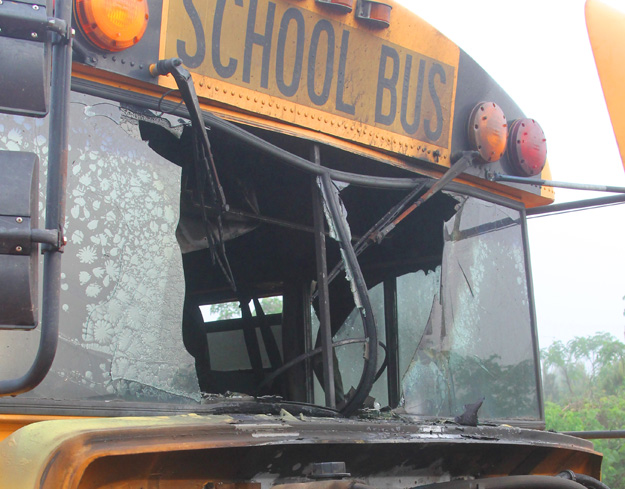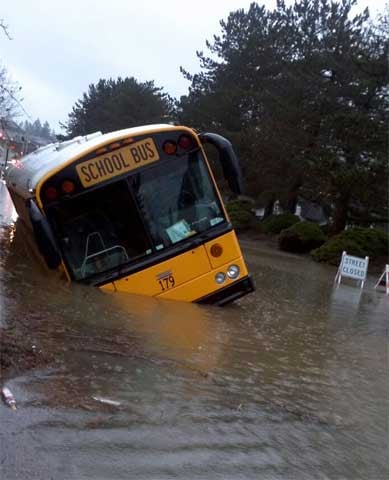As reported in The New York Times, "Affirmative Action Backlash Threatens Desegregation Plans, by Tamar Lewin, on 29 November 1998 -- In Arlington, Va., when Lara Tito, a white preschooler, did not get into the kindergarten at a popular alternative school, her parents joined with two other families and sued the district, challenging an admission system that set aside half of the 46 slots for members of minorities.
In Boston, the parents of Sarah Wessman, a white student rejected from the competitive Boston Latin School when several minority students with lower test scores were admitted, also went to court. Last week, the parents won a ruling giving their daughter a place and striking down racial preferences.

In Montgomery County, Md., a suburban Washington area known for the success of the voluntary desegregation policy it adopted in 1975, school officials face two lawsuits, one challenging the admissions policy for a program for gifted students, the other challenging the rules that stop children from transferring from a school if the departure will hurt the school's racial balance.
With these cases and others across the country, the long-standing debate over affirmative action in education, for years centered on universities and professional schools, is shifting down to public school districts, where an increasing number of parents -- mostly white -- are complaining about policies they say are unfair to their children.
Nearly a half-century after Brown vs. Board of Education, at a time when both the courts and the voters have turned against affirmative action, the question of whether the educational value of diversity justifies race-conscious policies in public schools is an open one, never directly addressed by the U.S. Supreme Court.
It is becoming a pressing issue, as the desegregation orders imposed by the courts decades ago are lifted in more and more areas. In recent years, judges have ended desegregation orders in Nashville; Oklahoma City; Denver; Wilmington, Del.; and Cleveland, ruling that the effects of past segregation had been remedied and no further judicial scrutiny was required.

School lawyers say there is enormous uncertainty about whether those districts -- and hundreds that were never under court order but adopted voluntary desegregation plans -- can continue race-conscious policies, and, if so, what kind.
Both at schools that use weighted admissions to diversify the student body and at those, like New York City's Stuyvesant High School, that have neither racial preferences nor many African-American or Hispanic students, teachers, parents and students are as divided over affirmative action as the nation at large, unsure how to balance the need for diversity against the goals of fairness and academic excellence.
Many parents and teachers said the legal battles were less a measure of racial attitudes than of the struggle for a good education at a time when so many public schools are mediocre, or worse.

In many communities, desegregation plans included the creation of magnet schools, which increase parent choice and attract more applicants than can be accommodated -- but rarely a representative share of minority families. The federal government provides special financing for such schools under guidelines that allow race-conscious policies if they are the only means to increase integration and narrowly tailored to minimize the burden on other races.
To increase diversity without invoking lawsuits, many of these magnet schools are broadening the factors they consider to include not only race and ethnicity but also leadership, personal achievement, socioeconomic status and the language spoken at home. They are also putting new energy into increasing their applicant pool by recruiting in target neighborhoods.
The legal parameters of race-based policies in those schools, and elite competitive high schools like Boston Latin, are likely to be determined in a crop of upcoming cases.

In Arlington, Va., in what is probably the most closely watched case, a U.S. District Court ruling against the Arlington Traditional School's admissions policy is being appealed to the 4th U.S. Circuit Court of Appeals.
Though the original case produced a ruling that the school could not set aside places for minorities and the three children involved are now first-graders there, a new case was filed the following year on behalf of two other families after the school adopted a lottery system giving extra chances not only to racial minorities but also to poor students and those for whom English is a second language.
The federal judge rejected that, too, but the Justice Department, the National School Boards Association and other education groups are backing the school district on appeal.

In Charlotte, N.C., site of the 1971 Supreme Court ruling upholding court-ordered busing, the parent of a white girl denied a place at a magnet elementary school filed a lawsuit challenging an admission policy using separate lotteries for white and nonwhite children. That complaint has been joined to the overall case on whether the original desegregation order should be lifted.
In Montgomery County, Md., the lawsuit on the transfer policy is being appealed to the 4th U.S. Circuit Court of Appeals.
And in San Francisco, where a long-standing court decree mandates that no more than 40 percent of the enrollment of a school be of one ethnic group, a Chinese-American parent sued over the admission policy at the competitive Lowell High School, where Chinese-Americans had to score higher than other ethnic groups to gain admission. The case, scheduled for trial next year, seeks to dismantle the entire district's desegregation plan.



Cool!
ReplyDelete